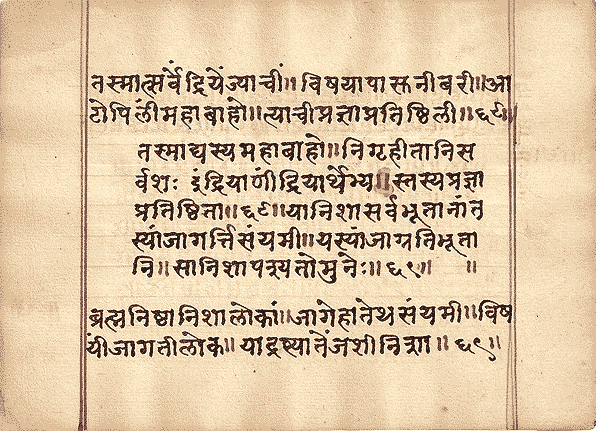
tasmād yasya mahā-bāho nigṛhītāni sarvaśaḥ
indriyāṇīndriyārthebhyas tasya prajñā pratiṣṭhitā
Update RequiredTo play the media you will need to either update your browser to a recent version or update your Flash plugin.
he mahābāho (O mighty-armed one!),
tasmāt (therefore) yasya (he whose) indriyāṇi (the senses) indriyārthebhyaḥ (from the objects of the senses) sarvaśaḥ (completely) nigṛhītāni (withdrawn) [
santi]
(they are),
tasya (his) prajñā (wisdom) pratiṣṭhitā (steady) [
asti]
(it is).
| tasmāt |
– |
av. – therefore (from: tat sn. 5n.1 m. – from that); |
| yasya |
– |
yat sn. 6n.1 m. – he whose (correlative of: tasya); |
| mahā-bāho |
– |
mahā-bāhu 8n.1 m.; BV: yasya bāhū mahāntau staḥ saḥ – O you who have mighty arms (from: √mah – to magnify, mahant – great; √baṁh – to grow, to increase, bāhu – the arm); |
| nigṛhītāni |
– |
nigṛhīta (ni-√grah – to hold, to restrain) PP 2n.3 n. – withdrawn; |
| sarvaśaḥ |
– |
av. – completely, entirely, altogether, on all sides (from: sarva – all, whole); |
| indriyāṇi |
– |
indriya 2n.3 n. – the senses (from: √ind – to be powerful); |
| indriyārthebhyaḥ |
– |
indriya-artha 5n.3 m.; TP: indriyāṇām arthebhya iti – from the objects of the senses (from: √ind – to be powerful, indriya – the senses; √arth – to strive to obtain, to desire, to request, artha – purpose, advantage, concern, object, wealth); |
| tasya |
– |
tat sn. 6n.1 m. – his; |
| prajñā |
– |
prajñā 1n.1 f. – discrimination, wisdom, judgement (from: pra-√jñā – to know, to understand, to discern); |
| pratiṣṭhitā |
– |
prati-ṣṭhita (prati-√sthā – to stand firmly) PP 1n.1 f. – fixed, firm, steady; |
sarvaśaḥ → sarvataḥ (from all, completely);
tasya prajñā pratiṣṭhitā → sthita-prajñā ca sa smṛtā (he is known as the one with steady wisdom);
The key:
an excerpt from the commented verse
quotes from the scriptures
starting polemic
|
Having explained in several ways the proposition enunciated in 2. 60 – 61, the Lord concludes by reaffirming the same proposition:
|
|
yatato hi ity upanyastasyārthasya anekadhā upapattim uktvā taṃ cārtham upapādya upasaṃharati – |
|
Therefore, O mighty-armed, his knowledge is steady
whose senses have been entirely restrained from sense-objects.
|
|
tasmād yasya mahābāho nigṛhītāni sarvaśaḥ |
indriyāṇīndriyārthebhyas tasya prajñā pratiṣṭhitā ||2.68|| |
|
It has been shown that evil arises from the senses pursuing sense-objects. Wherefore, that devotee’s knowledge is Steady whose senses have been restrained from sense-objects (such as sound) in all forms, subjective and objective.
|
|
indriyāṇāṃ pravṛttau doṣa upapādito yasmāt tasmāt yasya yateḥ he mahābāho, nigṛhītāni sarvaśaḥ sarva-prakāraiḥ mānasādi-bhedaiḥ indriyāṇi indriyārthebhyaḥ śabdādibhyas tasya prajñā pratiṣṭhitā ||2.68|| |
tasmād uktena prakāreṇa śubhāśraye mayi niviṣṭa-manaso yasya indriyāṇi indriyārthebhyaḥ sarvaśo nigṛhītāni tasyaivātmani prajñā pratiṣṭhitā bhavati
indriya-saṃyamasya sthita-prajñatve sādhanatvaṃ coktam upasaṃharati tasmād iti | sādhanatvopasaṃhāre tasya prajñā pratiṣṭhitā jñātavyety arthaḥ | mahābāho ! iti sambodhayan vairi-nigrahe samarthasya tavātrāpi sāmarthyaṃ bhaved iti sūcayati
hi yasmād evaṃ tasmād iti | sarvaśaḥ sarvāṇi samanaskāni | he mahābāho iti sambodhayan sarva-śatru-nivāraṇa-kṣamatvād indriya-śatru-nivāraṇe ‚pi tvaṃ kṣamo ‚sīti sūcayati | spaṣṭam anyat | tasyeti siddhasya sādhakasya ca parāmarśaḥ | indriya-saṃyamasya sthita-prajñaṃ prati lakṣaṇatvasya mumukṣuṃ prati prajñā-sādhanatvasya copasaṃharaṇīyatvāt
yasya nigṛhīta-manasaḥ | he mahā-bāho ! iti yathā śatrūn nigṛhṇāsi, tathā mano ‚pi nigṛhāṇeti bhāvaḥ
tasmād iti | yasya man-niṣṭha-manasaḥ pratiṣṭhitātma-niṣṭhā bhavati | he mahābāho iti yathā ripūn nigṛhṇāsi tathendriyāṇi nigṛhāṇety arthaḥ | ebhiḥ ślokair bhagavan-niviṣṭatayendriya-vijayaḥ sthita-prajñasya siddhasya svābhāvikaḥ | sādhakasya tu sādhana-bhūta iti bodhyam

